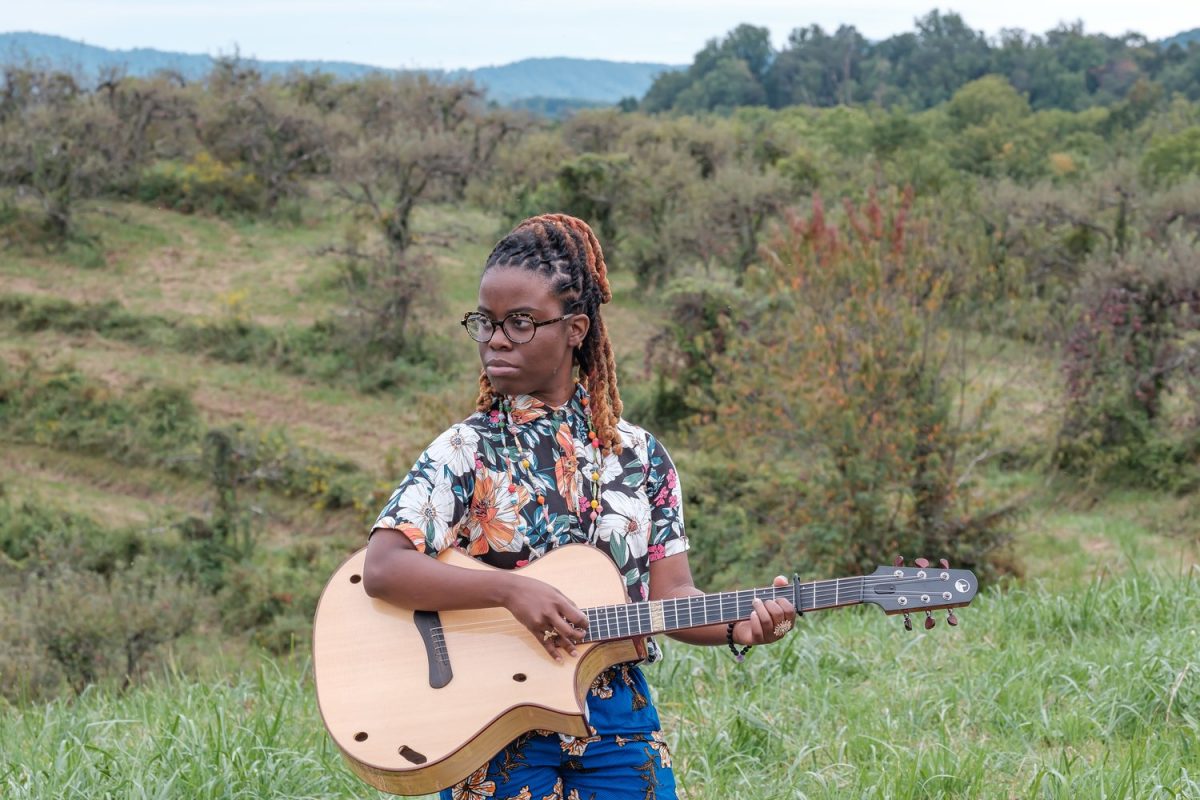By Dave Cantor
Yasmin Williams translated her enthusiasm for the video game Guitar Hero into a music degree.
After finishing up at New York University and moving back to Northern Virginia, where she grew up, the guitarist self-released Unwind, a sometimes somber, but playful, effort that seems to depict a performer pondering friendships and life, work, and making it through her 20s. The 2018 recording is by turns self-assured, unhesitant, and daring.
Williams isn’t in thrall to the folk world, despite most of her work being pretty firmly within those boundaries. She says meeting old-time and bluegrass players has been generally positive. But moreover, the audiences have been responsive, even if Williams seems to think the idea of genre is generally oppressive.
“If you’re playing old-time music, but it’s still experimental,” says the finger-style guitarist, “I’ll probably get along with you.”
After Unwind, folks at the SPINSTER imprint reached out. The label’s roster doesn’t adhere to a single genre, and its self-described radical feminist agenda made working with Williams for her second album a reasonable fit.
“It was a real honor to release Yasmin’s Urban Driftwood,” Emily Hilliard, a SPINSTER co-founder, wrote in an email. “[W]hile she is virtuosic in her technical playing, she never sacrifices lyricism, melody, and rhythm for pure demonstration of skill. It was so exciting to see this album propel Yasmin to much deserved recognition and opportunity.”
Driftwood is a collection of personal statements drawn from a politically turbulent time when Williams says she regularly attended Black Lives Matter protests in Washington, D.C. It not only focused the 2021 recording’s material, but her second full-length saw the composer expand her palette to include more percussion elements (she wears tap shoes to keep time) and affix a kalimba to the body of her guitar. The composer also brought along her high school music teacher, who contributes cello to a single track.
Even after returning to the commonwealth, Williams’ time in New York instilled in her a healthy skepticism for the business-side of the music industry. And releasing work through SPINSTER allowed her to retain a sense of independence.
“I thought that it would lead to better treatment, because at that point, I just associated labels with negativity,” she says. “So, being on a label that was smaller and more DIY, respected artists, and was [run by] radical feminists, I thought was really interesting. Not something you see a lot of. And as a woman musician, I thought it’d be really cool to put the record out with a label who’s not afraid to say what they are.”
Openness and veracity has sometimes been tough for an industry where luster and presentation can overwhelm skill and artistry. But for Williams, when she perceived a problem with performers latching onto acoustic, country, and folk traditions in a possible attempt to capitalize on the music’s popularity, she spoke up.
Writing for The Guardian earlier this year, Williams analyzed Cowboy Carter, saying “Beyoncé settled for using [Rhiannon] Giddens’ banjo and [Robert] Randolph’s pedal steel as props to back up the overall production on the record, instead of boosting these traditions to the forefront on an album with an artificial sheen.”
There’s a long, if often ignored, tradition of Black performers in America’s acoustic-music past. Apart from players like Elizabeth Cotten and Odetta, there’re scads of 20th-century recordings showing that country, folk, and bluegrass have never been a White respite.
Williams is part of that continuum, while having broad enough tastes and the acumen to expand it.
In a business that seems unforgiving—and sometimes unwilling to listen to the people actually making music—the guitarist says she didn’t anticipate the reception Driftwood received. The adulation, in part, led to Nonesuch Records offering her a deal. Since being founded more than 60 years ago, the imprint’s issued thousands of albums, running the gamut from contemporary, classical, and electronic recordings to Wilco.
Williams’ third album, due out this year, includes 20 guest performers and showcases her skills on acoustic and electric guitars, bass, and drums. She says it’s kind of full circle, the music in some ways hearkening back to an E.P. she released in high school.
At times, her two full-lengths hued toward a New Age sensibility, creating a musical intermission from the disordered world outside. Williams says some of the new album could “be considered relaxing,” though overall, it’s more rock-oriented than her most recent releases.
“A lot of the new record is about me digesting what it means to be a touring musician, but not just me being a musician,” she says. “It’s more of the things that are connected with being a musician, like being in an industry that’s kind of predatory and learning how to reckon with that in a way that’s positive and learning how to thrive in situations or environments that aren’t really made to help you.”
Williams’ music is intended to realize new artistic peaks and explore the complexities of being a person moving through the world, but it’s also for the enjoyment of audiences—or at least those receptive to alternate modes of guitar-playing and composing. It’s maintaining and growing that fanbase that can be difficult. And being on the road is a part of the work, though Williams says royalties and streaming revenue have been solid.
“Most of my day-to-day income is from touring,” she says, discussing how the music business can sometimes be extractive. “Traveling and touring for 50 years. Yeah, that to me, doesn’t seem viable for anyone. I don’t really know how anyone can do that.”
